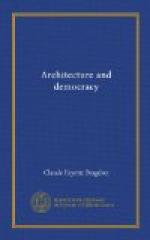In contrast to the schoolman he sketches the psychology of the active-minded but “uneducated” man, with sympathy and understanding, the man who is courageously seeking a way with little to guide and help him.
Is it not the part of wisdom to cheer, to encourage such a mind, rather than dishearten it with ridicule? To say to it: Learn that the mind works best when allowed to work naturally; learn to do what your problem suggests when you have reduced it to its simplest terms; you will thus find that all problems, however complex, take on a simplicity you had not dreamed of; accept this simplicity boldly, and with confidence, do not lose your nerve and run away from it, or you are lost, for you are here at the point men so heedlessly call genius—as though it were necessarily rare; for you are here at the point no living brain can surpass in essence, the point all truly great minds seek—the point of vital simplicity—the point of view which so illuminates the mind that the art of expression becomes spontaneous, powerful, and unerring, and achievement a certainty. So, if you seek and express the best that is in yourself, you must search out the best that is in your people; for they are your problem, and you are indissolubly a part of them. It is for you to affirm that which they really wish to affirm, namely, the best that is in them, and they as truly wish you to express the best that is in yourself. If the people seem to have but little faith it is because they have been tricked so long; they are weary of dishonesty, more weary than they know, much more weary than you know, and in their hearts they seek honest and fearless men, men simple and clear in mind, loyal to their own manhood and to the people. The American people are now in a stupor; be on hand at the awakening.
Next he pays his respects to current architectural criticism—a straining at gnats and a swallowing of camels, by minds “benumbed by culture,” and hearts made faint by the tyranny of precedent. He complains that they make no distinction between was and is, too readily assuming that all that is left us moderns is the humble privilege to select, copy and adapt.
The current mannerisms of Architectural criticism must often seem trivial. For of what avail is it to say that this is too small, that too large, this too thick, and that too thin, or to quote this, that, or the other precedent, when the real question may be: Is not the entire design a mean evasion? Why magnify this, that, or the other little thing, if the entire scheme of thinking that the building stands for is false, and puts a mask upon the people, who want true buildings, but do not know how to get them so long as Architects betray them with Architectural phrases?
And so he goes on with his Jeremiad: a prophet of despair, do you say? No, he seeks to destroy only that falsity which would confine the living spirit. Earlier and more clearly than we, he discerned the




